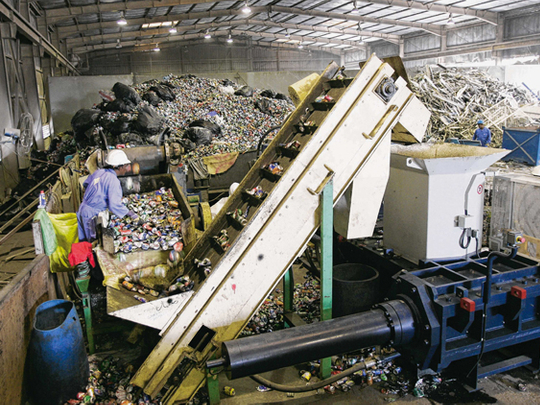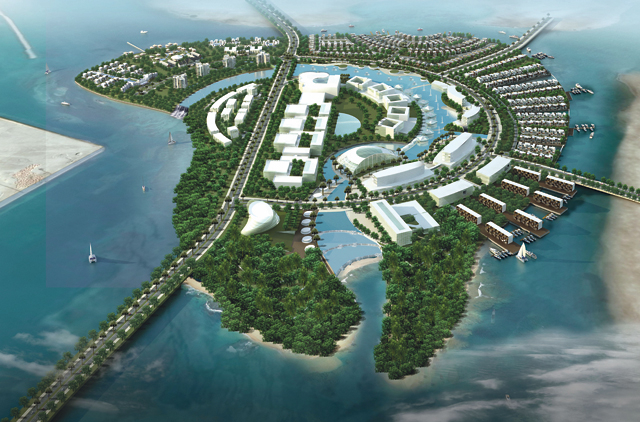
There's more to McDonald's than burgers and fries. The fast food giant's recent initiative to convert used vegetable oil from its kitchens in the UAE to biodiesel, to help run its trucks, has been the talk of the town. The initiative gained momentum through an agreement with Dubai-based Neutral Fuels, which started producing the biodiesel at its plant at the end of May.
Today, technology's impact on waste is such that it enables one man's junk to be another man's green resource.
"Technological innovations have changed the concept of waste disposal to waste management, where all the three R's — reduce, reuse and recycle — have been integrated on a daily basis," says Abdul Majeed Saifaie, Director of the Waste Management Department, Dubai Municipality.
New technologies for hazardous and medical waste are impressive, says Saifaie, as they offer sustainable treatments without environmental consequences. "The technology used in Dubai for the incineration of medical waste has made sustainability possible in the proper treatment of waste with no impact to residents' health or the environment," he says.
"We're currently in possession of an integrated hazardous waste facility, which can accommodate any solid or liquid hazardous waste for physical treatment, as well as a state-of-the-art medical waste incinerator with double-bag filtration, ensuring safe operations with no discharge of pollutants into the ambient air."
While technology increases efficiency without harming the environment, it also gives waste management companies a competitive edge, says Salman Shaban, Commercial Manager, Lucky Recycling.
"In this industry, technology distinguishes between a waste collector and a waste recycler. Lucky Group is a waste recycler that uses technologies to turn trash into cash while protecting the environment," he says.
Following the process
The materials have to be identified and sorted before recycling, which is where technology plays a crucial role, says Shaban. Thanks to technology, the company handles more than 300,000 tonnes of ferrous and non-ferrous scrap metal yearly, he says. "Magnetic conveyor belts are used to sort aluminium and iron used beverage cans. Alloy analysers separate the different grades and quality of scrap metal. We also use traditional technology, which uses the hand and tear test to differentiate between recyclable butyl and non-recyclable natural rubber tubes. The reverb furnace in our aluminium manufacturing plant separates the iron from aluminium at the time of melting," explains Shaban. "It's mainly due to these advanced technologies that we're able to handle such big volumes at our facilities."
Being able to generate a profit from operations plays a vital role in making waste management sustainable, says Asad Aziz Babar, Sales Manager, Mil-tek Middle East. "Sustainability is the most important thing, and can happen only when you generate revenues from reducing inputs such as manpower, space and energy," he says.
Saving energy
Thanks to Mil-tek's eco-friendly technology, the company can drastically reduce all forms of input, says Babar. "Normal bailing machines use hydraulic systems but ours is fully pneumatic. Because our technology senses how much pressure is required to compress the waste, we're able to save 40-60 per cent energy."
The technology reduces the space needed for operations because bulky skips are replaced by pallets, he says. "Manpower is also reduced because greater efficiency means workers don't need to make repeated trips outside the premises to remove bale. Only one pickup is now needed."
To help the private and public sectors make their waste management choices, Mott MacDonald offers tailored consultancy services, covering technology reviews and developments, contractual procurement solutions, tender evaluations and assistance in contract negotiations. The company has worked on Masdar City and UAE Desert Islands in Abu Dhabi, as well as Bahrain's Dilmunia Health Island among others.
"New emerging technologies are enabling us to provide more effective sustainable solutions to our clients that meet the continuous rising challenges of waste management in the region. Our proven track record allows us to help our clients meet regulatory requirements, recycling targets and reduce disposal costs," says Sherif Eldeek, Waste Management Consultant, Mott MacDonald.













